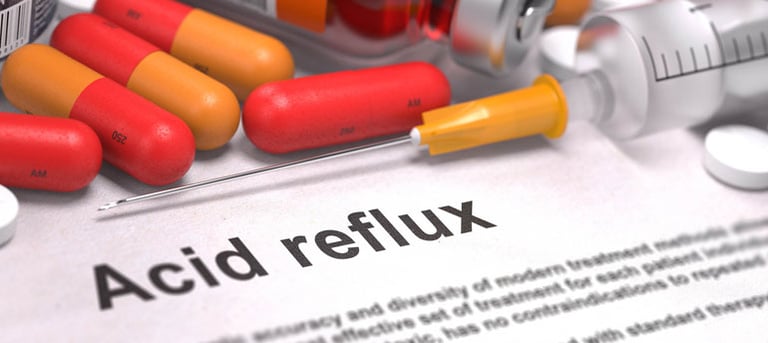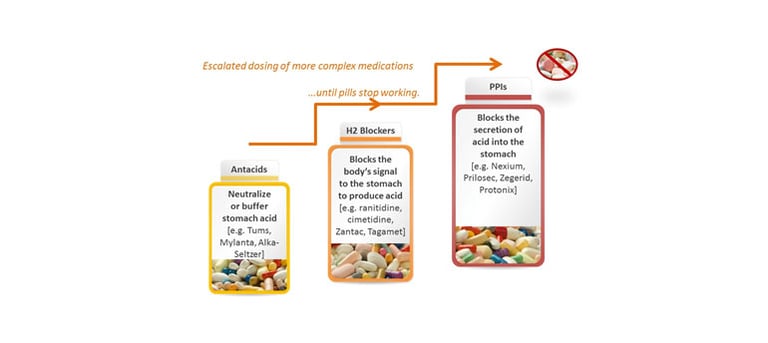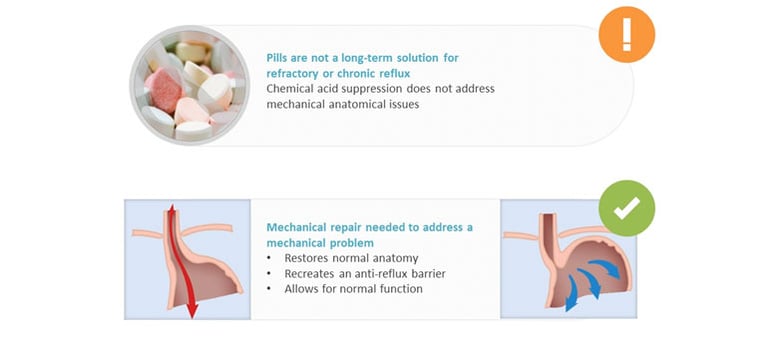
Medications are the first step in GERD treatment and an important element to limit the damage of abnormal exposure of the esophagus to refluxing gastric contents:
Initial treatments to control heartburn
Over-the-counter treatments that may help control heartburn include:

- Antacids that neutralize stomach acid.
Antacids, such as (Maalox), (Gaviscon), may provide quick relief. But antacids alone won't heal an inflamed esophagus damaged by stomach acid. They are able to reduce reflux while protecting the esophageal mucosa; moreover, the antacid-alginate combination increases the viscosity of the gastric contents by protecting the lining of the esophagus by gastric reflux. Overuse of some antacids can cause side effects, such as diarrhea or constipation.
- Medications to reduce acid production.
Called H-2-receptor blockers, the use of these drugs may be recommended in combination with proton pump inhibitors for a short period (two weeks), or as an alternative to them. These medications include Cimetidine, Famotidine, Nizatidine or Ranitidine (Zantac). H-2-receptor blockers don't act as quickly as antacids do, but they provide longer relief and may decrease acid production from the stomach for up to 12 hours. Stronger versions of these medications are available in prescription form.
- Medications that block acid production and heal the esophagus.
- Proton- pump inhibitors (PPI) are stronger blockers of acid production than are H-2-receptor blockers and allow time for damaged esophageal tissue to heal. Over-the-counter proton-pump inhibitors include Lansoprazole (Lanzor) ,Omeprazole (Omez), Rabeprazol (Pariet), and Esomeprazole (Nexium).
- Why Medications Don’t Treat The Problem?

Treatment options are a wide spectrum starting from simple measures including diet control and lifestyle modification, and can extend into medication treatment, and may require minimally invasive approach like treatment with Radiofrequency (Stretta) or by laparoscopic surgery (Nissen’s plication). Treatment is usually tailored according to the level and frequency of symptoms, stage of the disease, and more importantly the progression of symptoms which indicate poor control and need for further step up in the treatment of GERD.
This information is provided by the “Dr. Rami Hamed Centre” and is not intended to replace the medical advice of your doctor.
Read more:
- Heart Burn and GERD
- 7 Things Which You Should Avoid To Prevent GERD
- What Does Heartburn (GERD) Feel Like
- Heart Burn!! Know More Before It Affect Your Health
- Can Acid Reflux Or (GERD) Treated Only With Medications?
- Can Acid Reflux Or Heartburn Be Treated With Diet And Lifestyle Changes?
- How Does Stretta Treat GERD?
- It Is Important To Choose Hospital You Can Trust Your Health
- Non-Surgical GERD Treatment, Know The Benefits Of The Procedure
Topic: Gastroenterolgy











Leave a comment